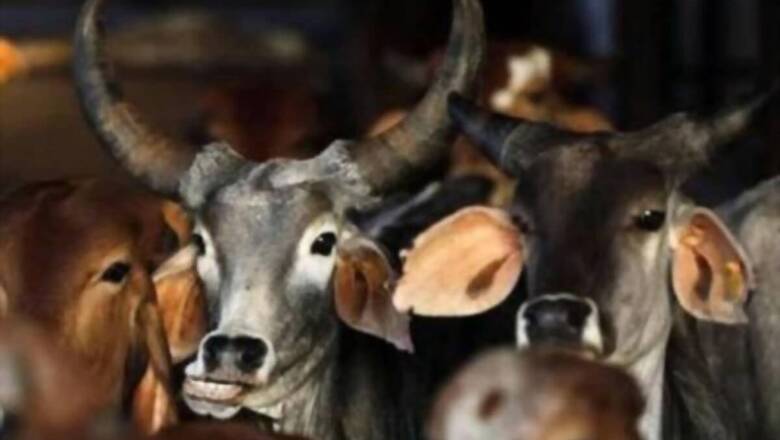
views
In a perfect world, laws to protect animals would eliminate all cruelty towards them. Dogs should not be bred and sold, cows and other animals should not be sent to slaughter, and birds should not be kept in cages. But sometimes change occurs in stages, and the proposed amendment to the Prevention of Cruelty to Animals (PCA) Act, 1960, by the government—increasing the penalty to Rs 75,000 or “three times the cost of the animal” and a jail term of up to five years (or both) for injuring or killing an animal—is a welcome move. People for the Ethical Treatment of Animals (PETA) India has long requested the government to consider this much-needed step.
Recently in Tamil Nadu, a flaming tyre was thrown at a bull elephant, setting him on fire and killing him. Meanwhile, two horses died during a protest in Delhi. Less than a year ago, a pregnant elephant was killed after being allegedly fed a pineapple stuffed with explosives in Kerala and a pregnant cow sustained near-fatal injuries resulting from accidental ingestion of explosives in Himachal Pradesh. Such heinous incidences of cruelty to animals are not restricted to certain regions, but are common across the country.
People convicted of such crimes often only pay a paltry fine of Rs 50, which acts as no deterrent. However, the punishment provided in the law is not the only concern –enforcement is another. Data compiled over five years by the Bombay Society for Prevention of Cruelty to Animals reveals that of the 19,028 cruelty-to-animals cases that were recorded during the period (2011-2016) in Mumbai, not one led to arrests or convictions. Though the Wildlife (Protection) Act (WPA), 1972, makes a crime involving protected wild animals punishable by up to seven years in prison and a fine of at least Rs 10,000, conviction rates are very low, and such crimes continue to be reported from every part of the country.
Increasing the provision for punishment under the law is important, but just as crucial is its effective implementation through public awareness, establishing and empowering law-enforcement agencies (such as the Animal Welfare Board at state level and the Society for Prevention of Cruelty to Animals at district level), and emphasising animal protection laws in legal curriculum and judicial training.
Changing With the Times
The Rs 50 fine was a stringent punishment in 1960, when it was equivalent to a monthly income for an average Indian household. Similarly, the permission given by the PCA Act to use animals for purposes such as work, food, experimentation, and performance is outdated. We now know that animals are sentient, intelligent beings who can feel fear, pain, love, and joy, just like us. In 1960, options to replace animals with other methods were very limited, but they aren’t anymore.
ALSO READ| 7 Yrs of Rigorous Imprisonment, Fines: 3 Exemplary Judgments May Help Curb Wildlife Crimes in Assam
These days, plant-based meats with the taste and texture of animal meat are available in India. Singapore recently gave regulatory approval for the sale of lab-grown meats (those made from cells, not by slaughtering animals). The entertainment industry has advanced to such an extent that a circus in Germany uses holograms instead of live animals. Many regulatory bodies in India, including the Indian Pharmacopoeia Commission and the Bureau of Indian Standards, have replaced tests on animals with in vitro methods. Educational bodies in India have introduced human patient simulators instead of teaching and training students using animals. Animal-drawn carts have been banned in cities like Delhi and Mumbai because of their inherent cruelty to animals and the danger they pose to traffic and the public.
The amendment to the PCA Act must reflect these progressive changes. There are modern, humane methods, so cruelty to animals can be completely prevented, which is the very intention of the law.
The Right to Life
The availability of compassionate choices isn’t the only reason changes should be made in our statutory laws for animals. As a country where animals are worshipped and culturally respected, it is a constitutional requirement to show them kindness. The Supreme Court of India in 2014 through a landmark judgment recognised that the Right to Life as enshrined under Article 21 of the Constitution of India extends to animals as well, conferring to them the right to live a life of intrinsic worth, honour, and dignity. The court also observed that speciesism— human supremacy over animals—is comparable to social evils like racism and sexism. Through different judgments, the High Court of Punjab and Haryana and the Uttarakhand High Court also recognised animals as legal entities.
Progressive steps must also be taken to amend the PCA Act and other legislation to prevent animals from being treated as mere property. Though the Indian Penal Code, 1860, provides for stringent punishments for maiming or killing an animal, Sections 428 and 429 require a “valuation” of the animal. Assigning a value to animals is archaic and supports speciesism. Thankfully, the WPA prohibits any commercial trade in protected Indian species.
Recently, the French National Assembly voted for an animal welfare bill. And, as per the Austrian Animal Welfare Act 2004, the protection and well-being of animals should be valued as highly as that of humans. Switzerland is the first country with legal provisions to protect animals’ dignity, and Germany the first country in the European Union to give animals constitutional protection.
ALSO READ| Endangered Dolphin Punctured, Mauled with Axes and Sticks in UP; 3 Held After Video Goes Viral
Though India has taken many progressive steps to protect animals, it is high time amendments were made to the PCA Act with an aim to remove any use of animals, as we don’t need to conduct archaic experiments on them, kill them for their meat and skin, or force them to do unnatural tricks for cheap entertainment.
We should also condemn regressive laws, such as the amendments made to PCA Act by a few states to allow cruel bull-taming and bull-racing and the recent amendment to the import policy allowing the import of exotic skins and furs again, particularly when we’ve learned that diseases like COVID-19 are linked to intensive wild-animal farming and live-animal markets.
While the proposed amendment to the PCA Act is a great step towards preventing cruelty to animals, we must work towards legislation protecting animals’ dignity and preventing them from suffering, as this is what they deserve.
Read all the Latest News, Breaking News and Coronavirus News here


















Comments
0 comment